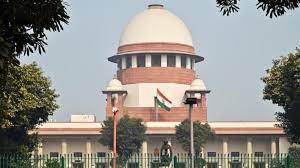NEW DELHI: Cautioning against the adverse impact of money power on the electoral process, the Supreme Court on Thursday said it created an exclusionary impact by reducing the democratic space for participation for both candidates and newer and smaller political parties.
“One way in which money influences electoral outcomes is through vote buying. Another way in which money influences electoral outcomes is through incurring electoral expenditure for political campaigns. Campaigns have a measurable influence on voting behaviour because of the impact of television advertisements, campaign events, and personal canvassing,” a five-judge Constitution Bench led by CJI DY Chandrachud which declared the electoral bonds scheme unconstitutional said.
The Bench sought to highlight that it was important to empower voters by allowing them to have access to information regarding funding of political parties.
“An informed voter is one who is assumed to be aware of the policy positions of the candidate or the party they represent and votes on a thorough analysis of the pros and cons of electing a candidate. On the other hand, an uninformed voter is assumed to not possess knowledge of the policy positions of the candidates,” it said.
“Money also creates entry-barriers to politics by limiting the kind of candidates and political parties which enter the electoral fray. Studies have shown that money influences the selection of candidates by political parties because parties would prefer fielding candidates who would be able to substantially self-finance their campaign without relying on the party for finance. In this manner, candidates who belong to socio-economically weaker sections face added barriers because of the close association of money and politics,” it noted.
“Money also excludes parties which are new to the electoral fray and, in particular, parties representing the cause of marginalised communities. Political parties which do not have enough finance have had to form electoral coalitions with other established political parties, which would in exchange shoulder a lion’s share of the campaign expenditure of the newly established political party extending to costs related to coalition propaganda, print and digital advertising, vehicle and equipment hire, political rallies, food transportation, and daily expenditure for party cadres,” the top court said.
“The compromises which newly formed political parties have to make lead to a dilution of the ideology of the party in exchange of its political sustenance,” it added.


